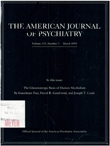The Vietnam War and the ethics of combat psychiatry
Abstract
It has been two decades since American troops were withdrawn from Vietnam, yet there has been little interest in resolving challenges that arose during the war regarding the ethical justification for military psychiatry's principles and field techniques for treating combat-generated casualties. Recently, thousands of American service persons were sent to fight in the Middle East accompanied by psychiatrists trained to use the same military treatment doctrine. In the wars before Vietnam, this doctrine had proved to be highly effective for treating individuals with combat stress casualties and returning them to duty. Furthermore, it was uncontroversial and later successfully adapted for use with civilian populations. During the Vietnam war, however, many psychiatrists intensely opposed a treatment regimen designed to induce symptomatic soldiers to believe that facing further combat risks would be in their best interest or that of the nation. As this review of the doctrine's rationale and ethical quandaries suggests, combat psychiatrists are influenced by powerful, potentially competing values systems but cannot realistically assess some of the most important factors that affect the balance of harm and benefit associated with their treatment decisions. This latest armed conflict reminds us of critical moral and ethical questions regarding the divided loyalties of combat psychiatrists--questions that should be addressed through future research and formalized professional guidelines.
Access content
To read the fulltext, please use one of the options below to sign in or purchase access.- Personal login
- Institutional Login
- Sign in via OpenAthens
- Register for access
-
Please login/register if you wish to pair your device and check access availability.
Not a subscriber?
PsychiatryOnline subscription options offer access to the DSM-5 library, books, journals, CME, and patient resources. This all-in-one virtual library provides psychiatrists and mental health professionals with key resources for diagnosis, treatment, research, and professional development.
Need more help? PsychiatryOnline Customer Service may be reached by emailing [email protected] or by calling 800-368-5777 (in the U.S.) or 703-907-7322 (outside the U.S.).



